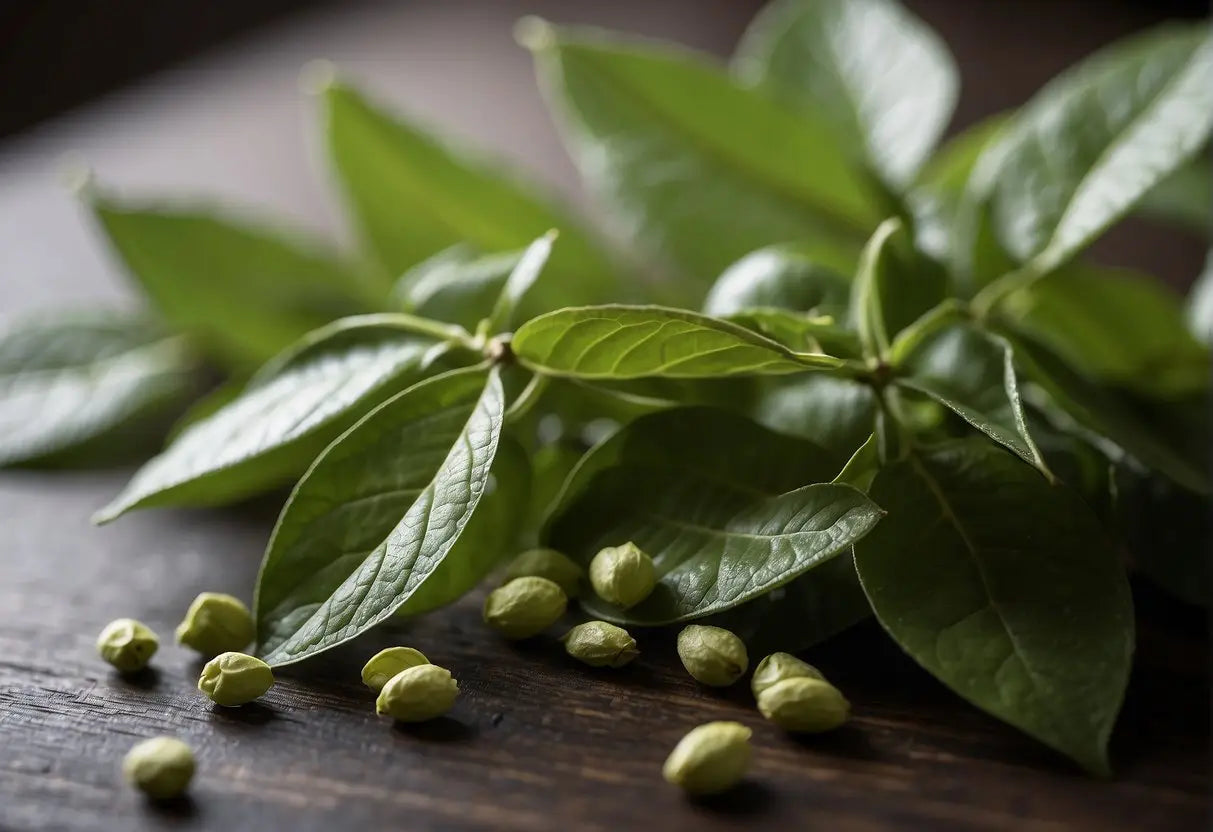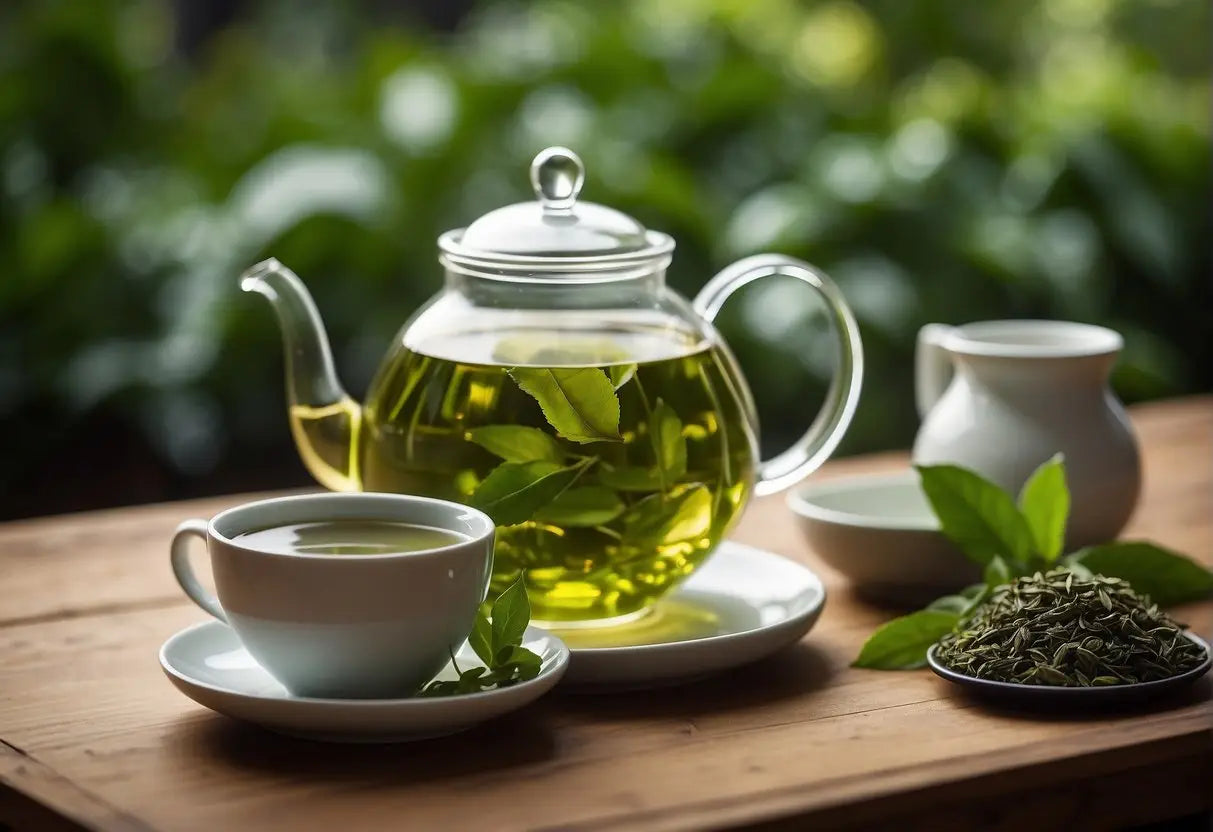Does Green Tea Help with Bloating
Green tea is reputed for its potential impact on improving digestive health. The key ingredients contributing to these effects are catechins and antioxidants, which may aid in reducing inflammation in the gastrointestinal tract.
Catechins, a type of polyphenol, are abundant in green tea and are known to have antimicrobial properties that could benefit your gut health by:
- Balancing gut flora
- Inhibiting the growth of bad bacteria
- Promoting the growth of good bacteria
Moreover, the antioxidants in green tea, specifically epigallocatechin gallate (EGCG), can help with oxidative stress in the digestive system.
Bestsellers
| Potential Benefits of Green Tea for Digestion |
|---|
| Soothes the stomach |
| Reduces bloating |
| Stimulates digestion |
| Enhances gut health |
To potentially alleviate bloating, you might consider drinking green tea moderately. However, ensure that your intake is balanced, as excessive consumption may lead to adverse effects.
Remember, while some studies suggest green tea supports digestive health, it is important to consult with a healthcare provider for personalized advice, especially if you have pre-existing digestive issues.
Active Compounds in Green Tea

Green tea contains bioactive compounds that may influence your health. These compounds contribute to its potential effects on bloating and digestion.
Catechins and Antioxidants
Catechins are a type of phenolic compound found abundantly in green tea. Among them, epigallocatechin gallate (EGCG) is the most researched and is known for its potent antioxidant properties. Antioxidants can help reduce oxidative stress in the body, which, in turn, supports digestive health.
- EGCG: Main catechin, powerful antioxidant
- Other Catechins: Epicatechin (EC), epicatechin gallate (ECG), and epigallocatechin (EGC)
The Role of Caffeine
Green tea also contains caffeine, a stimulant that can affect your body's metabolism. Caffeine's mild diuretic effect may assist with reducing water retention and, consequently, bloating.
- Caffeine content: Usually ranges from 20-45 mg per 8 oz serving
Green Tea Impact on Bloating

Green tea has been linked to digestive benefits, including the potential to reduce bloating. This is because of its various compounds with biological activity.
Direct Effects on Bloating
Green tea contains antioxidants called catechins, with epigallocatechin gallate (EGCG) being the most prominent. These substances may help reduce inflammation in the gastrointestinal tract, which is a common cause of bloating. Moreover, the natural compounds in green tea can increase the activity of digestive enzymes, potentially aiding your body in breaking down food more efficiently and reducing gas production.
Green Tea as a Diuretic
Green tea has mild diuretic properties due to its caffeine content. Caffeine can increase urine production, which may relieve water retention – a condition that can contribute to bloating. However, the diuretic effect of green tea is comparatively mild, making it suitable for regular consumption, unlike stronger diuretics that may deplete your body of essential electrolytes.
Recommended Green Tea Intake

When considering green tea for bloating, moderation is key. It's generally advised to have about 2-3 cups per day to experience potential benefits without overconsumption.
Lao Ban Zhang
Here’s a brief guide on how to integrate green tea into your routine:
- Morning: Start with a cup to kickstart your digestion.
- Afternoon: Have another cup post-lunch to aid in continued digestion.
- Avoid Late Evening: Sipping green tea late in the day can interfere with sleep due to caffeine content.
Keep in mind that green tea contains caffeine, albeit in lower amounts than coffee. If you're sensitive to caffeine, adjust your intake accordingly or opt for decaffeinated varieties.
| Time of Day | Suggested Intake |
|---|---|
| Morning | 1 cup |
| Afternoon | 1 cup |
| Late Evening | Avoid to reduce caffeine-induced sleep disturbances |
Remember to drink your green tea plain without added sugars to reap the most benefits. Overconsumption can lead to adverse effects, such as jitteriness or stomach upset. If you're under medication or have health concerns, consult your healthcare provider before incorporating green tea into your diet.
Potential Side Effects of Green Tea
Green tea is generally considered safe when consumed in moderation. However, overindulgence or certain pre-existing conditions may result in side effects.
Overconsumption Concerns
- Caffeine Sensitivity: Green tea contains caffeine, which in excess can lead to nervousness, sleep issues, and irritability. Limiting your intake is advisable if you experience these symptoms.
- Iron Absorption: Consuming high amounts of green tea may inhibit the absorption of non-heme iron, potentially leading to iron deficiency. This is particularly a concern for individuals with pre-existing iron-deficiency anemia.
- Stomach Problems: Overconsumption can also cause stomach irritation due to the tannins present, resulting in nausea or constipation.
Interactions With Medications
-
Blood Thinners: Green tea may amplify the effects of blood-thinning medications, increasing the risk of bleeding.
Medication Potential Interaction Recommended Action Warfarin Increased bleeding risk Consult your doctor before combining -
Stimulants: If you take stimulant drugs, the added caffeine from green tea could increase your heart rate and blood pressure.
Medication Type Potential Interaction Recommended Action ADHD Medications Increased heart rate Monitor heart rate regularly -
Other Interactions: Green tea may interfere with medications such as chemotherapy drugs and birth control pills. It is crucial to discuss with your healthcare provider to avoid adverse effects.
Medication Class Potential Interaction Recommended Action Chemotherapy Altered effectiveness Seek medical advice Contraceptives Decreased efficacy Confirm with a healthcare professional
Alternative Natural Remedies for Bloating

When you're experiencing bloating, several natural remedies can help alleviate discomfort.
Peppermint Tea: This soothing beverage can relax the digestive tract and improve bile flow, aiding in the digestion of fats and reducing gas and bloating.
Ginger: Incorporate ginger into your diet to help expel gas and ease stomach discomfort. You may consume it as tea or add fresh ginger to your meals.
- Chamomile Tea: A warm cup of chamomile tea may relieve bloating by reducing inflammation and calming the stomach muscles.
Fennel Seeds: Chew on a half teaspoon of fennel seeds after meals to promote digestion and reduce bloating.
- Pumpkin: Eating pumpkin is beneficial as it's rich in fiber and helps in reducing gas buildup.
Probiotics: Introduce probiotics into your diet, which can be found in yogurt, kefir, or supplements, to maintain a healthy balance of gut bacteria and aid digestion.
Here's a quick-reference table for you:
| Remedy | Method of Use | Potential Effects |
|---|---|---|
| Peppermint Tea | Drink 1-2 cups a day | Relaxes digestive tract |
| Ginger | Tea or included in meals | Helps expel gas |
| Chamomile Tea | Drink 1-2 cups a day | Reduces inflammation |
| Fennel Seeds | Chew after meals | Promotes digestion |
| Pumpkin | Include in meals | Reduces gas buildup |
| Probiotics | Consumed via foods or supplements | Aids in digestion |
Remember to incorporate these remedies moderately and observe how your body responds. If bloating persists, it's advisable to consult a healthcare provider.
← Older post Newer post →











